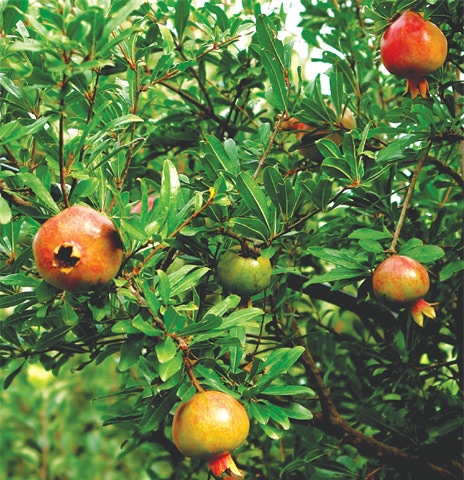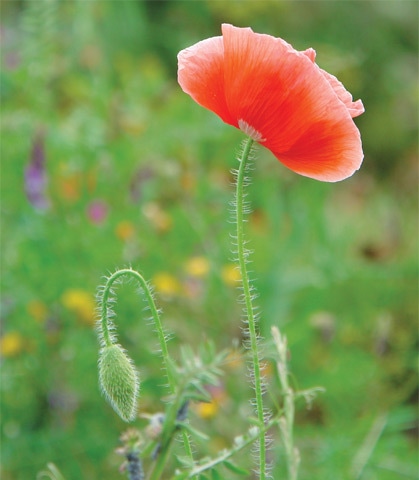
Q. I planted a pomegranate sapling in my garden just over three years ago. It fruited for the first time this season but all 30 pieces of fruit were infected. How can I protect the fruit next season?
A. It would be of great help if you explained what the fruit is ‘infected’ with. Is it insects, worms or — as I suspect it — black mould? Black mould
generally infects fruit which has split, so the best thing to do is to prevent the fruit from splitting. However, if you’re asking about an insect infection, please do let me know.
Help is on the way for all your gardening problems
Fruit — not just pomegranates but citruses as well — splits when the soil has been allowed to dry out around the roots and then, all of a sudden, is given a heavy dose of water due to irrigation water or rainfall.
As with many other fruits, the roots of pomegranate and citrus should not be starved of water when either flowering or fruiting. If you are unable to water regularly, apply and maintain a thick layer of moisture-conserving mulch. Regular watering is an absolute must for fruit trees in production otherwise they will suffer from fruit drop, small-sized fruit or dried-out fruit.
Q. Where can I get good quality, organic seeds in Karachi? I want seeds for organic rocket, spinach, lettuce, etc.
A. I suggest you check Empress Market or do an internet search for an organic seed supplier in Pakistan.
Q. The soil in my potted plants has become white around the edges. Even the top layer of soil seems white and hard but sometimes soft when rubbed. Should I be concerned?
A. Your soil is a white colour due to build up of salinity — either originating in the soil itself or from the water used for irrigation or due to a combination of both. Not all plants tolerate high levels of salinity. If possible, change the soil every six months or so and try filtering water before applying it. Salinity, in soil and water, is a common problem throughout the plains areas of the country and is extremely difficult to control.
Q. I recently moved into a house with a garden in Islamabad. I want to grow flowers and plants to adorn the house both inside and out but have no previous experience. Please suggest a website for basic gardening tips and also give suggestions on which flowers and plants can be grown in this season.
A. Studying this weekly column should help you on all fronts. Pay special attention to the column appearing on the first Sunday of each month as this provides information as to what to plant over the following four weeks.
Q. Where can I find watercress and avocado in Lahore and what are their Urdu names?
A. Watercress is either gageer or jargeer in Urdu and avocado is magar nashpati. If you are looking for plants then please check upscale nurseries but if you want the actual fresh produce then some specialist markets and supermarkets stock them when they are in season.

Q. Can we use homemade compost or compost purchased from the market to grow plants in pots?
A. Yes but I suggest mixing it 50/50 with top quality sweet earth first.
Q. Would you please provide a list of shade-tolerant vegetables that can be grown in containers in both summer and in winter?
A. Green leafy vegetables such as lettuce, spinach, Swiss chard/leaf beet, seasonal cabbage, seasonal cauliflower, mustard greens, bok hoy, mustard mizuna, endive and lambs lettuce will all tolerate a surprising amount of shade — more so in the heat of summer than in the cold of winter. Without exception all the vegetable listed above can be grown around the year.
Q. In addition to watering in the evening, is it true that watering plants between 11 pm and 3 am is also beneficial?
A. In the summer months if you are unable to sleep, then yes you can water the plants. Not only will it be good for your garden, it’s a relaxing pastime and will be beneficial for you too.
Q. Is it better to dig compost in or can it just be laid on top of the beds/pots/containers?
A. Digging it in encourages faster reaction from your plants as the compost, mixed into the soil, releases its nutrients quite rapidly. Laying it on top of the soil surface is a slower method but will feed both plants and soil over a reasonably long period of time. It depends on whether you want a fast or slow action — the choice is entirely up to you.
Please continue sending your gardening queries to zahrahnasir@hotmail.com. Remember to include your location. The writer does not respond directly by email. Emails with attachments will not be opened.
Published in Dawn, Sunday Magazine, December 25th, 2016















































Dear visitor, the comments section is undergoing an overhaul and will return soon.